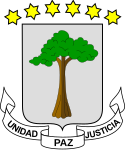1968 Spanish Guinean general election
 |
|---|
General elections were held in Spanish Guinea on 22 September 1968 to elect a President and National Assembly that would lead the country when it gained independence as Equatorial Guinea later that year. A second round of the presidential election was held on 29 September.
Francisco Macías Nguema of the Popular Idea of Equatorial Guinea led the field in the first round, advancing to a runoff with Prime Minister Bonifacio Ondó Edu. With the endorsement of eliminated candidates Atanasio Ndongo and Edmundo Bossio, Macías Nguema defeated Edu in the runoff. Edu's National Unity Movement of Equatorial Guinea and Ndongo's National Liberation Movement of Equatorial Guinea won ten seats each in the National Assembly, while the Popular Idea won eight.[1] Voter turnout was 67 percent in the first round and 79 percent in the second round.
After Macias Nguema's victory, he appointed Ndongo as Equatorial Guinea's first Foreign Minister and Bossio as Vice-President, while he ordered Edu's execution shortly after independence. To date, it has been the only free election ever held in Equatorial Guinea. Over the next four years, Macias Nguema consolidated his power step by step; in 1970 he set up the United National Workers' Party as the only legally permitted party in the country and by 1972 he had declared himself President for Life with dictatorial powers. As a result, the 1968 elections would be the last contested elections held in the country until 1993.
Results
President
| Candidate | Party | First round | Second round | |||
|---|---|---|---|---|---|---|
| Votes | % | Votes | % | |||
| Francisco Macías Nguema | Popular Idea | 36,716 | 40.05 | 68,310 | 62.92 | |
| Bonifacio Ondó Edu | National Unity Movement | 31,941 | 34.84 | 40,254 | 37.08 | |
| Atanasio Ndongo | National Liberation Movement | 18,223 | 19.88 | |||
| Edmundo Bossio | Bubu Union | 4,795 | 5.23 | |||
| Total | 91,675 | 100.00 | 108,564 | 100.00 | ||
| Valid votes | 91,675 | 98.62 | 108,564 | 99.51 | ||
| Invalid/blank votes | 1,281 | 1.38 | 537 | 0.49 | ||
| Total votes | 92,956 | 100.00 | 109,101 | 100.00 | ||
| Registered voters/turnout | 137,755 | 67.48 | 137,755 | 79.20 | ||
| Source: African Elections Database | ||||||
National Assembly
| Party | Seats | |
|---|---|---|
| National Liberation Movement | 10 | |
| National Unity Movement | 10 | |
| Popular Idea | 8 | |
| Bubu Union | 7 | |
| Total | 35 | |
| Source: African Elections Database | ||
Elected members
- Alfredo King Tomas
- Ángel Etugu Oguono
- Antonio Eworo Obama
- Antonio Ndongo
- Armando Balboa
- Clemente Ateba Nso
- Cristina Makoli
- Cristóbal Ondó Alogo
- Domicilio Sila
- Enrique Ncuna Ndongo
- Federico Makendengue Eouabo
- Gaspar Copariate Burkbake
- Gustavo Watson Buebake
- Juan Bestue
- Juan Nguema
- Julio Ngundi Nadjaba
- Lorenza Matute
- Manuel Gerona Hombria
- Manuel Nguema Obono
- Marcelino Ngale Econo
- Marcelo Epám Uri
- Mariano Ganet Bokuo
- Mariano Mba Michá
- Martín Esono Ndongo
- Maximiliano Michá
- Primo José Escono Micá
- Raimundo Ela Nvé
- Ramon Itanguino Elambani
- Ricardo Bolopá Esape
- Roberto Jora
- Salvador Boleko Ripole
- Saturnino Ibongo Ivanga
- Sebastián Oburu Masie
- Pastor Torao Sikara
- Salvador Nsamio Nsema[2][3]
References
- ^ Elections in Equatorial Guinea African Elections Database
- ^ Rafael de Mendizábal Allende (2018) Misión en África. La descolonización de Guinea Ecuatorial (1968-1969) p102
- ^ Africa; revista de acción española, Volume 25, p24
